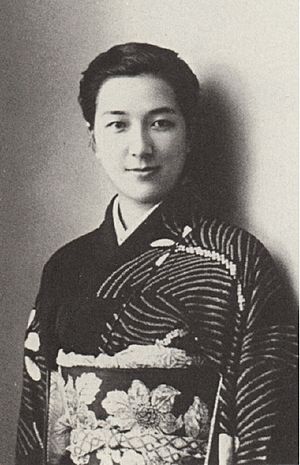Noriko Ibaragi facts for kids
Noriko Ibaragi (茨木 のり子, Ibaragi Noriko) was a talented Japanese writer. She wrote poems, plays, and essays. She also wrote stories for children and translated books from other languages. Noriko Ibaragi is famous for her poem, "When my beauty shone." She wrote this poem about Japan's defeat in World War II. In 1953, she helped start a magazine called Kai (which means "Oars"). Later in life, at age 50, she learned the Korean language. She even translated Korean poems into Japanese.
Contents
Early Life and Education
Noriko Ibaragi was born in Osaka City, Japan. She spent her childhood in Nishio, Aichi City. In 1943, she went to the Imperial Women's Pharmaceutical College in Tokyo. This school is now known as Toho University.
During her time at college, she lived through World War II. She experienced many difficult things, like air raids and not having enough food. In 1945, when she was 19, she heard the radio broadcast that announced Japan's defeat. At that time, she was working as a student helper in a Navy medical factory. She wrote about this experience in her famous poem, Watashi ga ichiban kirei datta toki. She finished college in September 1946.
Becoming a Writer
After seeing a play called A Midsummer Night's Dream at the Imperial Theatre, Noriko Ibaragi decided she wanted to write plays. In 1946, her first play, Tohotsumioyatachi, was nominated for a Yomiuri Prize.
In 1948, she wrote two children's stories. These stories were called Kai no ko puchikyū and Gan no kurukoto. Both of these stories were broadcast on NHK radio.
In 1950, she married a doctor named Miura Yasunobu. They moved to Tokorozawa, Saitama. She started sending her poems to a magazine called Shigaku. Her poem, Isamashī uta, was chosen to be published in September 1950.
Starting a Poetry Magazine
In 1953, Noriko Ibaragi helped create a new poetry magazine. It was called Kai (Oars). She started it with another writer named Hiroshi Kawasaki. At first, the magazine only had poems by Ibaragi and Kawasaki. But soon, other famous poets joined them. These poets included Shuntarō Tanikawa, Yūjirō Funaoka, Hiroshi Yoshino, and Hiroshi Mizuo.
Later Life and Achievements
In 1976, when Noriko Ibaragi was 50 years old, she decided to learn Korean. She became very good at it. In 1990, she won a Yomiuri Prize for her translations of Korean poems.
Her poetry book, Yorikakarazu, was published in 1999. It was featured in a big newspaper called Asahi Shimbun. This book became very popular and sold 150,000 copies.
Noriko Ibaragi passed away on February 19, 2006. She was 79 years old.
Images for kids
 | Sharif Bey |
 | Hale Woodruff |
 | Richmond Barthé |
 | Purvis Young |



